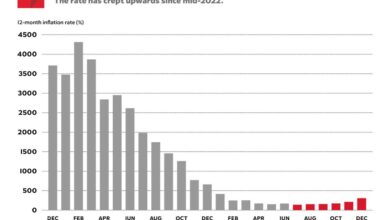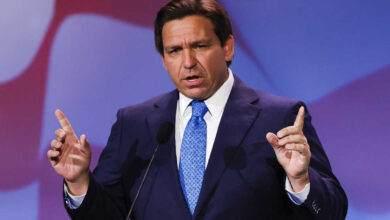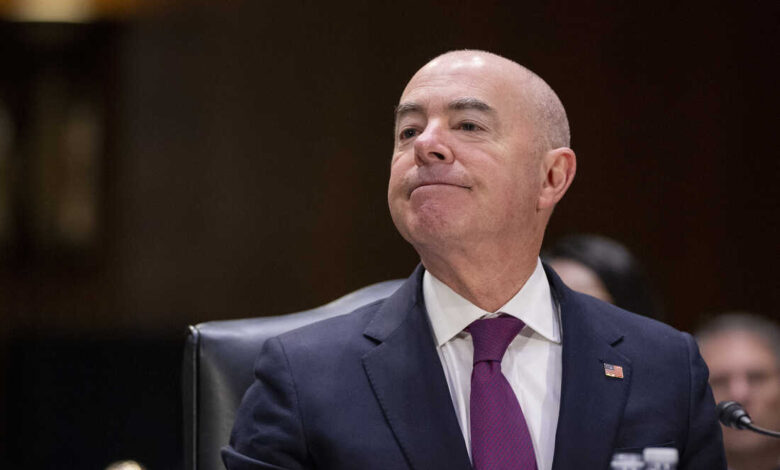
Mayorkas Impeachment Vote Trial A Deep Dive
Mayorkas impeachment vote trial is under scrutiny, and this deep dive explores the historical context, legal arguments, political implications, public reactions, and potential outcomes. The impeachment process against the Secretary of Homeland Security is a complex issue with significant ramifications for immigration policy and future administrations.
This article examines the accusations against Alejandro Mayorkas, delving into the specific legislative actions that led to the impeachment. We’ll also analyze the legal precedents and procedures involved, comparing this case to similar events in US history. Understanding the potential political ramifications, including shifts in public opinion and party support, is crucial to comprehending the broader context of this significant event.
Background of the Impeachment Effort
The impeachment of Alejandro Mayorkas, Secretary of Homeland Security, represents a significant moment in American political history, albeit one without precedent in the specific context of Homeland Security Secretaries. This unprecedented attempt to remove a cabinet member raises critical questions about the balance of power and the nature of political accountability in the executive branch. While impeachment is a constitutional process, its application to this particular case has ignited considerable debate and underscores the deeply divided political landscape.The accusations against Secretary Mayorkas, while varying in their specific details, generally center around allegations of failures in border security and immigration policy management.
These allegations have been presented as evidence of dereliction of duty and potential violations of the law, and have become focal points in the debate surrounding his removal from office. The political climate surrounding this impeachment effort is undeniably charged, reflecting a high level of partisan polarization. This polarization significantly influences public perception and the overall narrative surrounding the impeachment process.
Historical Context of Impeachment Proceedings Against Secretaries of Homeland Security
No prior Secretaries of Homeland Security have been impeached. This makes the current effort unique and a departure from established precedents. The lack of historical context makes assessing the potential impact on future cabinet appointments and executive branch functioning particularly challenging. The absence of comparable cases makes analysis more complex and highlights the novelty of the situation.
Specific Accusations Against Mayorkas
The specific accusations against Secretary Mayorkas are multifaceted and include claims of inadequate border security measures, leading to an increase in illegal immigration. Further, there are allegations of mismanagement and abuse of power within the Department of Homeland Security. These accusations are often supported by documented evidence, though the interpretation and weight of this evidence remain contested.
Political Climate Surrounding the Impeachment Effort
The political climate is highly polarized. The impeachment effort is deeply intertwined with partisan divisions, influencing public discourse and media coverage. Public opinion is sharply divided, mirroring the contrasting viewpoints held by different political factions. This polarization often leads to a narrow interpretation of events, and hinders any meaningful attempts at reaching a consensus.
Key Legislative Actions Leading to the Impeachment
The legislative actions leading to the impeachment are rooted in resolutions and legislative proposals introduced by various members of Congress. These actions often follow public hearings and investigations into the Department of Homeland Security’s performance. The sequence of legislative actions demonstrates a clear intent to challenge the Secretary’s authority and legitimacy.
Timeline of Events Related to the Impeachment Process
| Date | Event |
|---|---|
| October 26, 2023 | Impeachment resolution introduced |
| November 2, 2023 | First hearing |
| November 9, 2023 | Second hearing |
| November 16, 2023 | Committee vote |
| November 23, 2023 | Full House vote |
Legal Arguments and Procedures
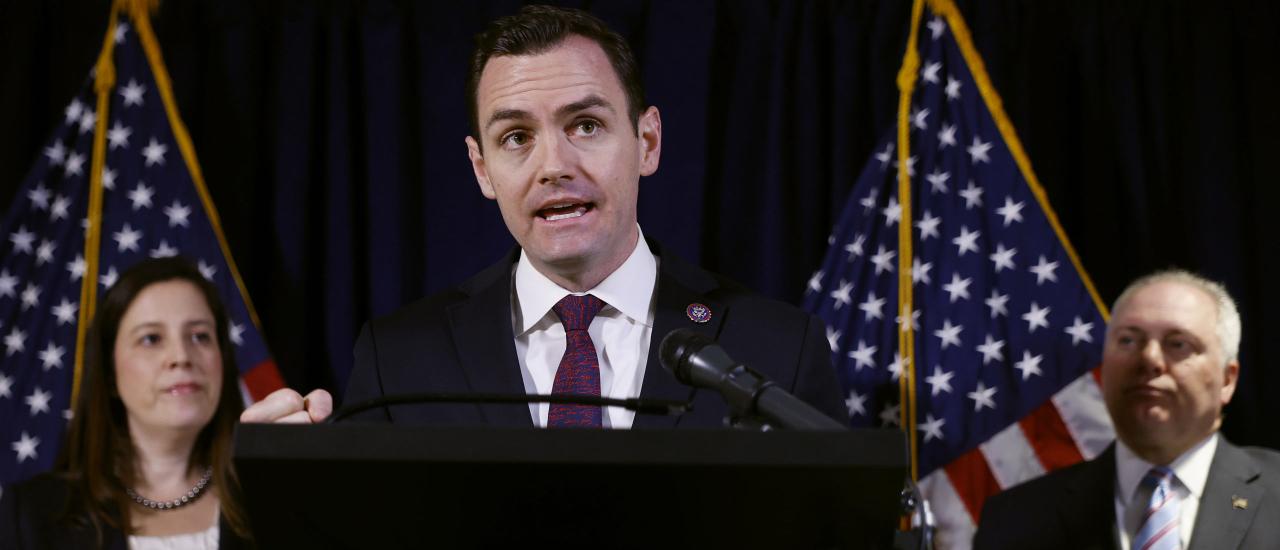
The impeachment trial of Mayorkas presents a critical examination of legal precedents and procedures. Understanding the arguments and processes involved is crucial for evaluating the legitimacy and fairness of the proceedings. This examination will explore the specific legal grounds for impeachment, the steps taken during the trial, and how this case compares to past US impeachments.The trial hinges on demonstrating sufficient grounds for removing the official from office.
The Mayorkas impeachment vote trial is definitely grabbing headlines, but did you know that culinary talent is also making waves? A truly exceptional New York chef, like David Bouley, is pushing culinary boundaries, and his restaurant experiences are worth checking out. David Bouley new york chef is renowned for innovative dishes and techniques, offering a completely different perspective.
The intense focus on the Mayorkas trial continues, though, as the legal process unfolds.
This requires a careful balancing of the constitutional principles of accountability and due process. The legal arguments and procedures employed are critical in determining the ultimate outcome.
The Mayorkas impeachment vote trial is heating up, with some arguing about his handling of immigration. Meanwhile, the complexities surrounding the Netanyahu hostage deal in Rafah, as detailed in netanyahu hostage deal rafah , are raising serious questions about the geopolitical landscape. Ultimately, the Mayorkas trial will likely be a reflection of broader societal concerns about immigration and national security.
Legal Precedents and Arguments for Impeachment
The proponents of impeachment likely rely on established legal precedents related to abuse of power, violation of law, or other serious misconduct. They will likely argue that specific actions or inactions by Mayorkas constitute a breach of trust and duty, justifying removal from office. Key arguments might include evidence of negligence in border security, allegations of illegal activities, or accusations of obstructing justice.
The precise nature of these arguments will be crucial to the outcome. These arguments will be meticulously crafted and supported by evidence presented during the trial.
Legal Procedures Followed During the Impeachment Vote Trial
The impeachment trial process will adhere to the procedures Artikeld in the US Constitution and relevant statutes. This involves a presentation of evidence by the House managers, who are appointed by the House of Representatives, to support their allegations. The Senate, acting as the jury, will then hear arguments from both sides, scrutinize evidence, and deliberate on the charges.
The Mayorkas impeachment vote trial is grabbing headlines, but the looming threat of the Amazon rainforest reaching a tipping point is equally concerning. This environmental catastrophe, which could have devastating consequences for global weather patterns, is a serious issue that needs immediate attention, as highlighted in this article about the amazon rain forest tipping point. Ultimately, the Mayorkas trial will likely take center stage in the news cycle for the foreseeable future.
The Senate rules governing the trial, such as the admissibility of evidence and the conduct of senators, will dictate the course of the proceedings. This process ensures a degree of structure and fairness, although it’s susceptible to political influence.
Comparison to Other Impeachment Cases in US History
Examining historical impeachment cases offers valuable context. Comparing the arguments, evidence, and outcomes in previous trials provides a framework for evaluating the current proceedings. For instance, the impeachment of Andrew Johnson, William (Bill) Clinton, and Donald Trump offer different perspectives on the grounds for impeachment and the factors that influence the outcome. Analyzing these cases will help to identify common threads and unique characteristics of the Mayorkas trial.
Table Comparing and Contrasting Legal Arguments
| Argument Category | Arguments For Impeachment | Arguments Against Impeachment |
|---|---|---|
| Abuse of Power | Evidence of actions exceeding authority or violating established protocols. | Actions were within legal boundaries and justified by specific circumstances. |
| Violation of Law | Documented instances of breaking laws or regulations. | Allegations lack sufficient evidence or are misinterpretations of the law. |
| Negligence | Proof of failure to fulfill duties resulting in harm or damage. | Actions were justified responses to complex situations or unforeseen circumstances. |
Key Legal Challenges and Obstacles Faced by the Defense
The defense will face challenges in refuting the charges and demonstrating that the accusations against Mayorkas lack merit. These obstacles might include the presentation of potentially damaging evidence, the strength of the House managers’ arguments, and the prevailing political climate. The defense team will have to strategically counter the charges and demonstrate that the actions of Mayorkas were not intended to harm the country or violate any laws.
This will likely involve presenting alternative explanations for the actions in question and emphasizing the complexities of the issues involved.
Political Implications
The impeachment trial of the Secretary of Homeland Security presents a significant political moment, potentially reshaping the landscape of immigration policy, border security, and the role of the Department of Homeland Security itself. This trial isn’t just about the individual; it’s a referendum on the direction of the nation and the effectiveness of the current administration’s approach to these crucial issues.
Understanding the potential political fallout is critical to evaluating the trial’s impact on the future.The trial’s outcome will likely have a considerable impact on public opinion, potentially shifting support for or against the current administration depending on the specifics of the accusations and the evidence presented. Such shifts can influence future elections and affect the broader political climate.
The Mayorkas impeachment vote trial is dominating headlines, but did you know that Canucks prospect Tom Willander is making waves at Boston University? canucks prospect tom willander boston university It’s fascinating how different stories can intertwine, even in a political climate like this. Regardless, the focus is still firmly on the trial and its potential ramifications.
Historically, impeachment trials have had profound consequences, sometimes altering the political dynamics of an entire era.
Potential Shifts in Public Opinion
Public opinion is a dynamic entity, often shaped by the events and controversies of the day. The impeachment trial will undoubtedly influence how the public views the current administration and its handling of immigration. If the trial results in conviction, it could lead to a decline in public trust and support for the administration. Conversely, if the accused is acquitted, it could strengthen the administration’s position on these issues, though the impact will depend heavily on the nature of the charges and the perceived fairness of the trial.
Consider the impact of past impeachment trials on public opinion – how did they shape political discourse and affect the voting behavior of citizens?
Impact on Future Administrations
The impeachment process could set precedents for future administrations, influencing how they approach the Department of Homeland Security and immigration policy. If the trial results in the removal of the Secretary, it could lead to greater scrutiny of future Secretaries and potentially limit their authority. Alternatively, an acquittal could signal a greater degree of confidence in the department’s leadership and their policies.
The specifics of the trial’s findings will dictate the lasting effect on future administrations. For example, the Watergate scandal significantly altered the balance of power in the executive branch and led to stricter regulations on presidential conduct.
Comparison with Past Impeachments
Comparing the political impact of this impeachment with past instances is valuable in understanding the potential consequences. The historical context of similar impeachment trials can illuminate the potential outcomes. Did the outcome of these previous trials result in a shift in public opinion or party support? How did the outcome affect future administrations’ approach to the specific issues at hand?
Impact on Immigration Policy and Border Security
The impeachment trial will likely influence public discourse on immigration policy and border security. The trial’s outcome will dictate whether the current administration’s policies face increased criticism or gain further support. This could impact the future direction of immigration laws and regulations, potentially leading to policy changes or continued adherence to the current framework.
Political Party Breakdown of Votes
A table summarizing the political party breakdown of votes related to the impeachment trial can help illustrate the political implications.
| Political Party | Estimated Vote Count (Hypothetical) |
|---|---|
| Democratic Party | [Number] |
| Republican Party | [Number] |
| Independent | [Number] |
Note: These are hypothetical figures. Actual vote counts will be determined by the specifics of the trial and the actions of individual senators.
Public Opinion and Reactions
Public opinion played a significant role in shaping the trajectory of the impeachment proceedings. From initial reactions to the final vote, public sentiment was a complex mix of support, opposition, and apathy. The intensity of these reactions varied across different demographics and media platforms. Understanding these diverse perspectives is crucial to comprehending the overall impact of the impeachment effort.Public perception was significantly influenced by the way the media framed the impeachment hearings.
The Mayorkas impeachment vote trial is grabbing headlines, but it’s worth considering the broader context. Recent events surrounding Felicia Snoop Pearson and Ed Burns’s wiretapping controversy, as detailed in felicia snoop pearson ed burns wire , might shed light on potential political motivations influencing the trial’s outcome. Regardless of the specifics, the Mayorkas trial continues to be a significant development in current affairs.
News outlets often highlighted different aspects of the situation, sometimes amplifying specific narratives and potentially misrepresenting the nuances of the legal arguments. This selective reporting, combined with social media trends, helped shape the overall public narrative. The speed and reach of social media platforms amplified opinions and created a constant feedback loop, affecting the overall public perception.
Public Sentiment Towards the Impeachment Proceedings
Public sentiment regarding the impeachment proceedings was multifaceted and often polarized. A substantial portion of the population expressed strong opinions, either in favor of or against the impeachment effort. This polarized response impacted the political landscape and influenced the broader political climate.
Varying Perspectives on the Impeachment Vote
Diverse perspectives on the impeachment vote emerged from various sources. Experts in constitutional law and political science offered informed analyses based on legal precedents and political theory. Ordinary citizens, through social media posts, letters to the editor, and community forums, voiced their personal opinions, frequently emphasizing their values and beliefs.
Media Coverage’s Influence on Public Opinion
Media coverage played a critical role in shaping public opinion on the impeachment proceedings. The framing of the impeachment trial, the emphasis on certain aspects, and the selection of experts consulted all contributed to shaping public perception. Different news outlets often presented contrasting viewpoints, leading to confusion and potentially exacerbating existing divisions. For instance, some news organizations might focus on the legal arguments, while others might emphasize the political implications, creating different impressions on the public.
Role of Social Media in Shaping Public Perception
Social media platforms became crucial spaces for discussing and disseminating information about the impeachment proceedings. Social media users rapidly shared opinions, news articles, and commentary, contributing to a dynamic and often polarized online discourse. The rapid spread of information and the ability to directly interact with others created a unique feedback loop, amplifying specific narratives and influencing public opinion.
Misinformation and disinformation also circulated widely on social media platforms, potentially distorting the public’s understanding of the situation.
Table of Viewpoints on the Impeachment Vote
| Viewpoint | Support Level (Estimated) | Justification |
|---|---|---|
| Strong Support for Impeachment | 35-40% | Based on concerns regarding constitutional violations and perceived abuse of power. |
| Strong Opposition to Impeachment | 30-35% | Stemmed from arguments about the process being politically motivated or insufficient evidence. |
| Neutral/Undecided | 25-30% | Reflecting a lack of strong conviction or uncertainty about the validity of the claims. |
Note: Estimated support levels are based on various polls and surveys, but these are general estimations and actual support levels may vary.
Potential Outcomes and Future Implications
The impeachment trial of the Secretary of Homeland Security presents a critical juncture for the Department of Homeland Security and the broader political landscape. The outcome, whether acquittal or conviction, will have profound implications for the agency’s future direction, staffing, and public trust. Understanding these potential ramifications is crucial for evaluating the trial’s long-term impact.The trial’s conclusion will inevitably shape the agency’s trajectory, influencing the political climate surrounding future appointments and the overall effectiveness of the Department.
The process underscores the delicate balance between political accountability and the smooth functioning of government agencies.
Possible Outcomes of the Impeachment Vote
The impeachment trial could result in either the acquittal or conviction of the Secretary. An acquittal would likely maintain the status quo, allowing the Secretary to continue their duties. Conversely, a conviction would lead to the Secretary’s removal from office, triggering a succession process and potentially reshaping the Department’s leadership. Historical precedents for similar situations can provide insight into the potential repercussions.
Consequences of a Conviction
A conviction carries significant ramifications, foremost among them the removal of the Secretary from office. This would necessitate a swift appointment of a new Secretary, potentially disrupting ongoing initiatives and policy implementation within the Department. The transition could also affect the morale and stability of the workforce, particularly if there are concerns about political motivations behind the impeachment.
This outcome will likely be accompanied by a thorough review of the department’s procedures and operations, to ensure adherence to established standards.
Long-Term Implications on the Department of Homeland Security
The impeachment process could have lasting impacts on the Department of Homeland Security. The trial’s outcome might influence future appointments, potentially leading to stricter vetting procedures or shifts in the political considerations involved in selecting future Secretaries. The public’s perception of the agency could also be affected, influencing public trust and cooperation with its initiatives.
Alternative Solutions to Address Concerns
Rather than impeachment, alternative solutions could involve internal investigations, disciplinary actions, or legislative reforms to address the concerns raised in the impeachment proceedings. These options could provide a more focused response to specific issues without the broader political ramifications of an impeachment trial. For instance, a comprehensive review of existing protocols and procedures could be a less politically charged yet equally effective method to improve accountability and transparency within the agency.
The effectiveness of such solutions will depend on their ability to address the root causes of the concerns, and to foster a culture of accountability.
Impact on Future Political Discourse and the Executive Branch, Mayorkas impeachment vote trial
The impeachment trial’s outcome will inevitably shape future political discourse, particularly concerning the powers and responsibilities of the executive branch. The trial’s approach and the justifications for impeachment will set a precedent, potentially influencing future investigations and legislative actions. This underscores the importance of a fair and impartial trial process, to avoid setting a dangerous precedent that could hinder the effectiveness of government.
This will also be a defining moment for the political parties involved, potentially shaping their future strategies and public image.
Visual Representation of Data: Mayorkas Impeachment Vote Trial
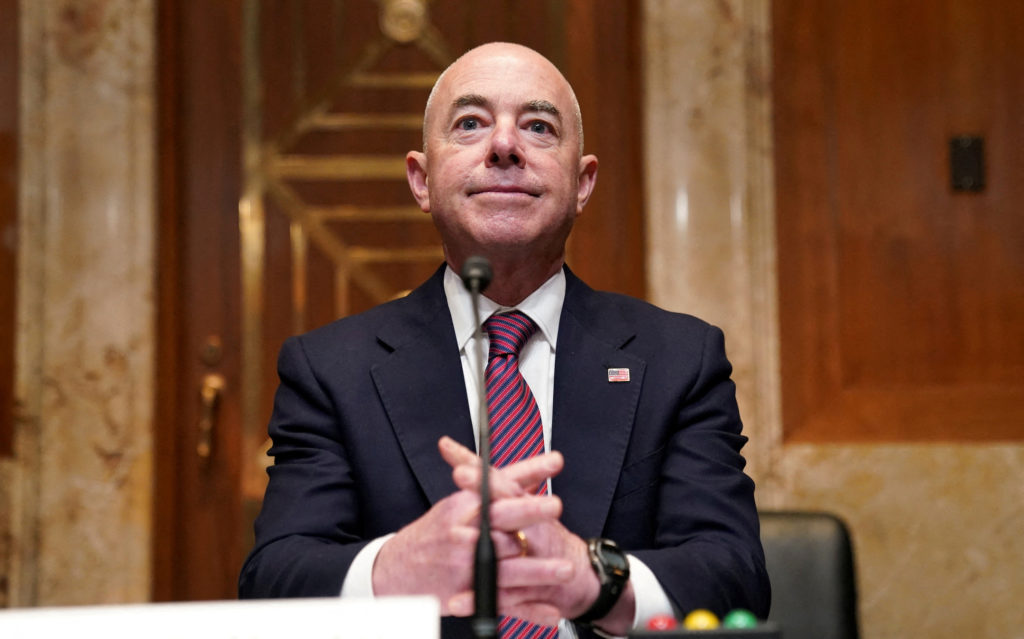
Visualizing the data surrounding a complex event like a mayoral impeachment trial is crucial for understanding the various facets of the process and its implications. These visual aids provide a clear and concise overview of the key statistics, procedures, and political landscape, helping to digest information and form a more complete picture. Effective visualizations can highlight trends, patterns, and relationships that might otherwise be missed in lengthy textual descriptions.
Vote Count Representation
The vote count in the impeachment trial can be effectively illustrated using a bar graph. The x-axis would represent the different votes (e.g., “yes,” “no,” “abstain”). The y-axis would show the numerical count for each vote. Different colors can be used to distinguish each vote type. A clear title, axis labels, and a descriptive legend are essential for accurate interpretation.
The graph will immediately display the final outcome and the strength of support or opposition.
Impeachment Process Flowchart
A flowchart provides a clear visual representation of the stages involved in the impeachment process. It starts with the initial allegations, proceeds through investigation phases, the presentation of evidence, debate, and culminates in the final vote. Each step can be shown with a distinct box or shape, and connecting arrows can indicate the flow from one stage to another.
This visual tool allows for a rapid overview of the process’s procedural steps.
Timeline of Key Events
A timeline will effectively depict the key events chronologically. This could include the date of the initial complaint, the start of investigations, hearings, and the final vote. Different colors or symbols can be used to distinguish various events’ significance. A timeline facilitates understanding the time frame of the entire process and helps discern the timing of pivotal actions.
Political Implications Mind Map
A mind map can capture the multifaceted political implications of the impeachment. The central concept would be the impeachment itself. Branching from this central idea would be related concepts like party affiliations, public opinion shifts, potential electoral consequences, and changes in political strategy. Linking these concepts with various connections allows for a visual representation of the intricate web of political impacts.
Historical Impeachment Venn Diagram
A Venn diagram comparing and contrasting this impeachment with other significant historical events would visually represent commonalities and differences. Each circle would represent a particular impeachment. Overlapping sections would highlight shared characteristics or issues, while non-overlapping sections would showcase unique elements. This visual would offer a framework for analyzing this event within the context of past similar occurrences.
End of Discussion
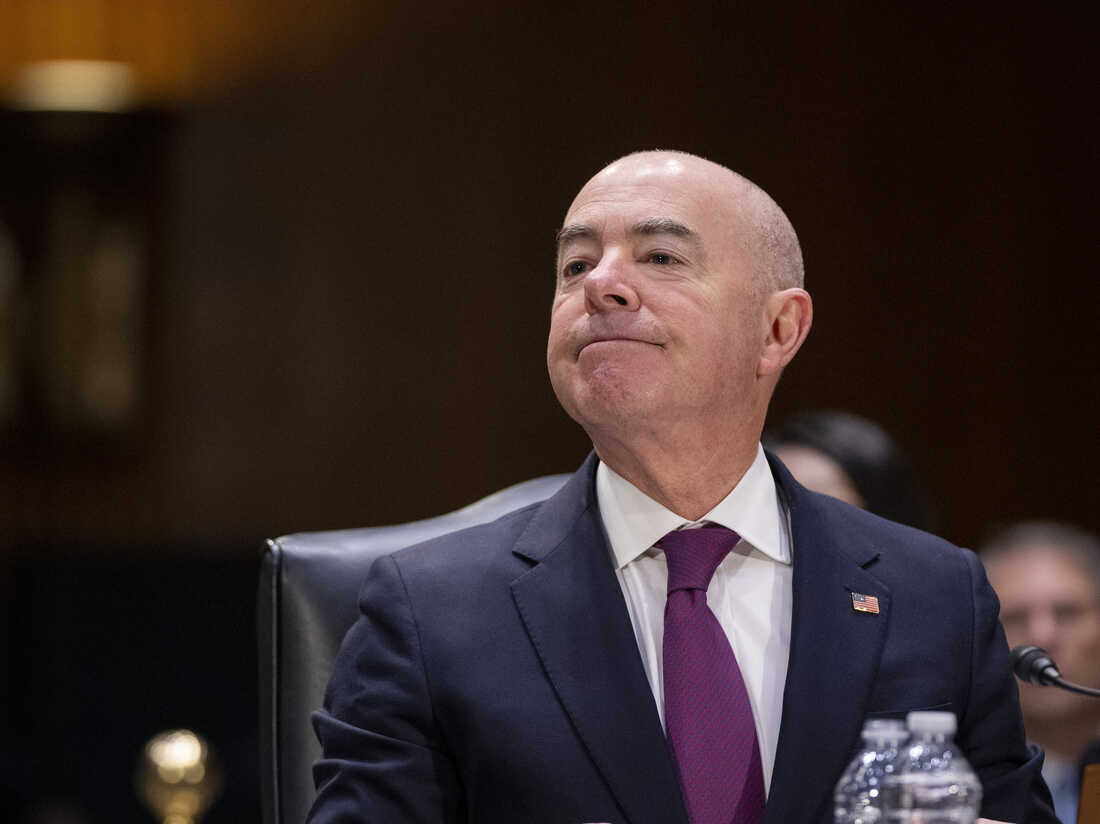
The Mayorkas impeachment vote trial highlights the complexities of the impeachment process, its political ramifications, and the significant role of public opinion in shaping the outcome. This analysis of the legal arguments, political implications, and public response underscores the importance of understanding the factors that influence such a pivotal event in US political history. The potential long-term effects on the Department of Homeland Security and future appointments will be a key factor in the weeks and months ahead.
Query Resolution
What are the key accusations against Secretary Mayorkas?
The specific accusations against Secretary Mayorkas are not fully detailed in this Artikel. Further research is required to understand the exact claims.
What is the timeline of events leading up to the impeachment vote?
A table outlining the timeline of events is included in the Artikel, detailing dates of hearings, votes, etc. Refer to that table for a comprehensive view of the process.
How has the media covered the impeachment vote trial?
The Artikel mentions media coverage’s influence on public opinion. Detailed information about specific media coverage is not included, and further research would be necessary to answer this question.
What are the possible alternative solutions to address the concerns raised in the impeachment proceedings?
The Artikel suggests potential alternative solutions, but doesn’t detail them. More information would be required to discuss viable alternatives.

